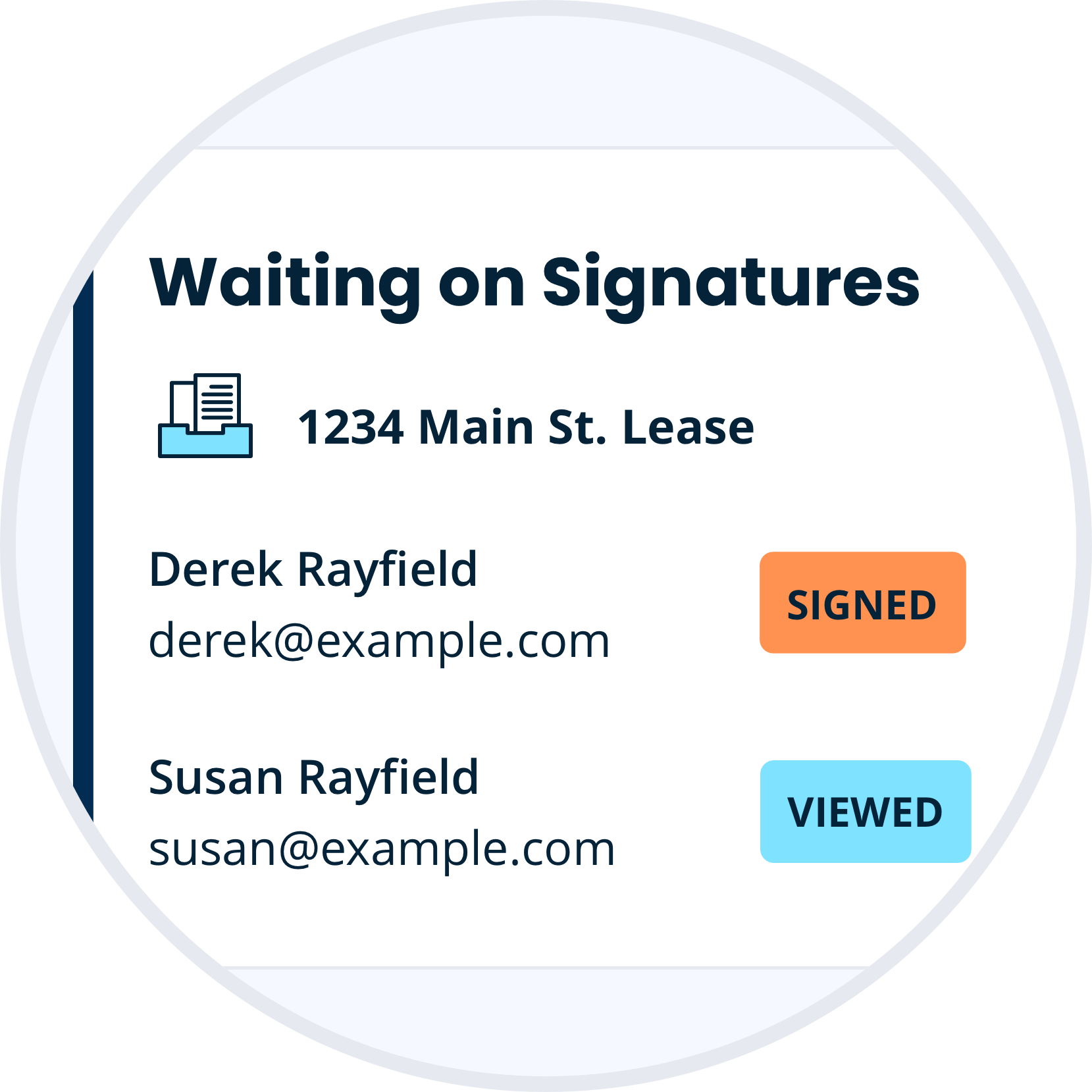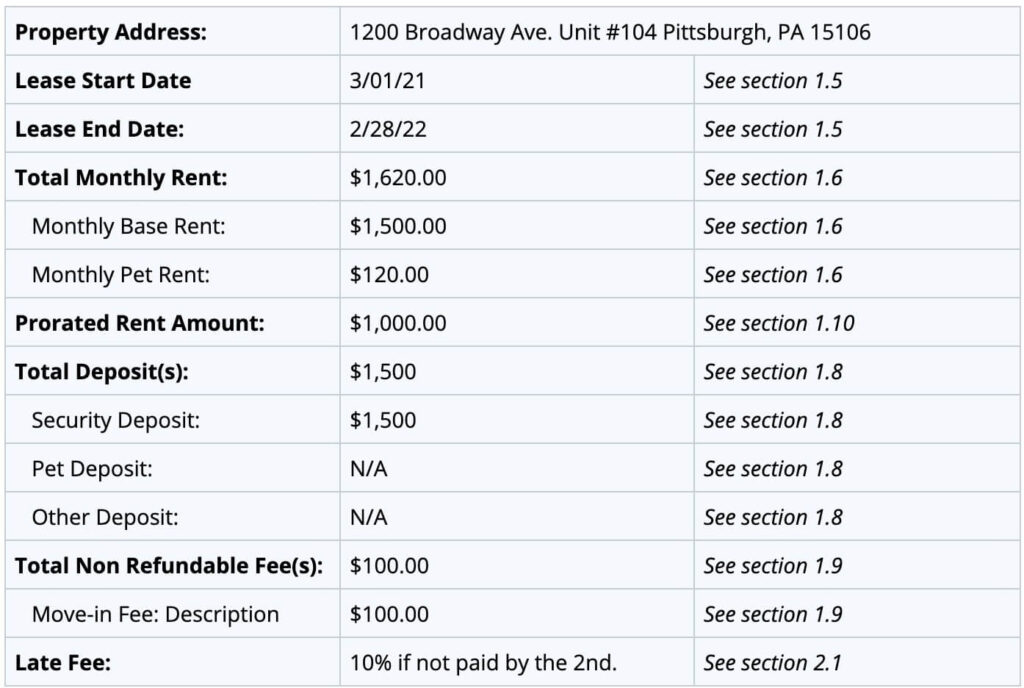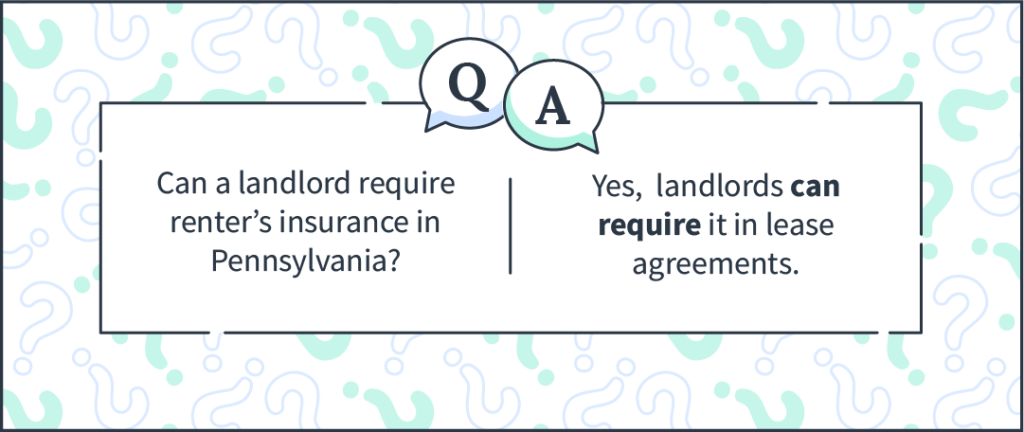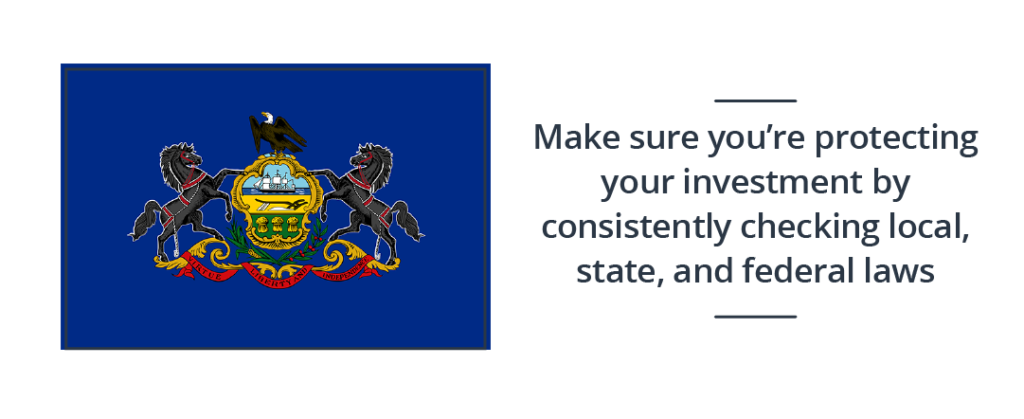Table of Contents
- Pennsylvania Tenants’ Rights and Landlord Responsibilities
- Pennsylvania Landlords’ Rights and Tenant Responsibilities
- Application/Screening Fees
- Criminal Background Check
- Security Deposit
- Pennsylvania Lease Agreement Sample
- Pennsylvania Landlord-Tenant Law FAQ
- Due Diligence and Landlord-Tenant Laws in Pennsylvania
- Pennsylvania Landlord-Tenant Law
Pennsylvania secured a vital place in America’s early history. It’s also being known for its beautiful landscapes, easy public transportation, and Philly cheesesteaks. The Keystone State has so much to offer – including highly-ranked universities and the sixth largest economy in the United States. As Pennsylvania continues to thrive and expand, the rental market continues to grow and stay competitive.
Laws that impact the rental market, landlords, and tenants are constantly being decided in states. Make sure you know what’s on your ballot – find Pennsylvania voting information.

Pennsylvania Tenants’ Rights and Landlord Responsibilities
- Return security deposit within 30 days
- Tenants have a right to “repair and deduct”
- Landlords must disclose some information to renters
When it comes to Pennsylvania rental laws, there are a few specifics landlords need to know:
- Security Deposits – Landlords must return the security deposit within 30 days of a tenant moving out. Landlords also may not charge more than two months worth of rent for the security deposit.
- Rent Withholding – If a landlord fails to make a repair, the tenant has a right to pay for the repair and deduct the cost from their next month’s rent.
- Information Disclosure – Landlords must disclose certain information to their tenants. This information includes how the landlord will hold the security deposit and how long they have to return it after the tenant moves out.
- Eviction Process – If a tenant fails to pay rent, they have 10 days to pay. If they fail to pay after 10 days, the landlord may file for an eviction.
Pennsylvania Landlords’ Rights and Tenant Responsibilities
- Tenants have 10 days to retrieve property
- There are no rent raising laws
- Landlords have 30 days to make repairs
- Abandoned Property – Once a tenant moves out of a property, they have ten days to contact the landlord to claim any abandoned property. The landlord must send a notice to the renter, and if after ten days the tenant still has not claimed the property, then the landlord may throw it away as they see fit.
- Raising Rent – Pennsylvania does not have any laws that limit a landlord raising rent.
- Property Maintenance – Tenants must keep the property clean and undamaged, and landlords have 30 days from when they are notified of any problems to fix them. Landlords are legally required to keep the implied warranty of habitability; otherwise, tenants have a right to withhold rent.
- Harmful Behavior – If a tenant engages in harmful or dangerous behavior, only a 24-hour notice to move out is required. Don’t be afraid to notify law enforcement in dangerous situations.
- Evictions – If a tenant violates the lease terms, you must give them 30 days to move out after providing the eviction notice.
Application/Screening Fees
- HUD (Federal) laws do not classify criminal backgrounds as a protected class, but making a decision to rent based off a criminal background alone could lead to a discrimination charge as it impacts certain protected groups of people disproportionately.
- However, if the criminal background check revealed a crime for the manufacture and distribution of drugs, homicide and/or stalking, denying the application is allowed.
- Landlords should have a consistent and equal policy or procedure in place to follow regarding criminal background checks so as not to discriminate against one class of people over another.
- HUD states that a landlord cannot ask about arrest records, only convictions, as innocent people are commonly arrested though the situation may not have resulted in a conviction.
- Some municipalities may have written their own laws expanding onto what you can and cannot ask regarding criminal backgrounds during the tenant screening process.
Criminal Background Check
The State of Pennsylvania has no added laws or restrictions around the collection of criminal background checks. Adherence to general federal law is required. To avoid the perception of discrimination, make sure your screening criteria is stated and is consistent and equal for all groups of people.
Security Deposit
- The maximum amount Pennsylvania landlords can charge for a security deposit is two month’s rent for new rentals, and one month’s rent for tenants renewing for their second through fourth year. You cannot charge an additional security deposit after they’ve rented from you for at least five years.
- Pennsylvania landlords must place the security deposit into a separate bank account for the full term of the lease.
- The bank name and location must be listed in the lease.
- Landlords must return the security deposit within 30 days after tenant moves out, along with an itemized statement of any lawful charges.
Build a Pennsylvania lease agreement in less than 15 minutes.
Pennsylvania Lease Agreement Sample
There are three sections to a residential lease agreement. The first section outlines the custom details of the contract, such as who’s involved and for what address. Here’s an example Pennsylvania lease agreement listing details found in Section 1:
Pennsylvania Landlord-Tenant Law FAQ
Below are answers to some of the most commonly-asked questions when it comes to landlord-tenant laws in Pennsylvania:
How Long Does a Landlord Have to Fix Something in Pennsylvania?
Pennsylvania law states a landlord must fix something within a reasonable amount of time. Landlords must adhere to the Warranty of Habitability which is included in every lease to make sure the property is safe to live in. For example, if the rental property is in need of a critical repair, such as fixing the heat, a landlord must fix it within 24 hours. When it comes to non-critical emergencies, a landlord has 14 days to make the repair.
Can a Landlord Require Renters Insurance in Pennsylvania?
Renters insurance is not required by law in Pennsylvania, but some landlords will require it in their lease.
How Much Notice Does a Landlord Have to Give to Enter a Rental Property in Pennsylvania?
In Pennsylvania, a landlord must give reasonable notice before entering a property – usually, 24-hours advanced notice. There needs to be written notice – if emergency repairs are needed, landlords can enter the property to stop any damage that is occurring.
Due Diligence and Landlord-Tenant Laws in Pennsylvania
TurboTenant has utilized many municipal sources along with official state statutes in order to compile this information to the best of our ability. However, local laws are always in flux and landlords and tenants alike should be sure to do their due diligence and consult legal help when it’s needed. We hope the following list can serve as a valuable resource and allow you to succeed as a tenant or landlord in Pennsylvania. Be sure to take proper precautions when it comes to finding the top candidates for your unit by utilizing our online rental application and tenant screening services.
Disclaimer: TurboTenant, Inc does not provide legal advice. This material has been prepared for informational purposes only. All users are advised to check all applicable local, state, and federal laws and consult legal counsel should questions arise.

Unlimited Everything.
Create a single Pennsylvania lease agreement, or subscribe and receive unlimited lease agreements, landlord forms pack, and e-signs for a simple annual fee. Be confident with all the legal forms and tools you need as a professional landlord.
Discover Our Unlimited PlanPennsylvania Landlord-Tenant Law
- Tenant’s Rights in Pennsylvania
- “LANDLORD AND TENANT ACT OF 1951” – 68 P.S. §§ 250.101-250.602
- All about Leases and Landlords – Pennsylvania Bar Association
Pennsylvania Fair Housing Resources
Federal Fair Housing Resources
- Federal Fair Housing Act
- United States Department of Housing and Urban Development (HUD)
- Civil Rights Act of 1968 (Wikipedia)
Other State Resources
- LANDLORD AND TENANT ACT – DISPOSITION OF ABANDONED PERSONAL PROPERTY
- REAL AND PERSONAL PROPERTY – TITLE 6
- Renting a Home – PENNSYLVANIA BAR ASSOCIATION
Pennsylvania Associations
Pennsylvania City-Specific Housing Resources
Pittsburgh
- Allegheny County Information for Renters
- A TENANT’S GUIDE TO RENTING – Neighborhood Legal Services Association
- REALTORS® Association of Metropolitan Pittsburgh
Philadelphia
- City of Philadelphia – PARTNERS FOR GOOD HOUSING
- City of Philadelphia – Lead Paint Disclosure and Certification Law
- City of Philadelphia – Fair Housing Commission
- City of Philadelphia – Tenant Landlord
- Greater Philadelphia Association of REALTORS®
Allentown
- Lehigh County Authority – Landlord / Tenant Guidelines
- Allentown Tenant Association
- Greater Lehigh Valley REALTORS®
Reading
Scranton
Bethlehem
- City of Bethlehem – Regulated Rental Unit Occupancy
- Lehigh County Authority – Landlord / Tenant Guidelines
- Greater Lehigh Valley REALTORS®
Lancaster
- Tenant / Landlord Rights & Responsibilities – Lancaster Housing Opportunity Partnership
- City of Lancaster Rental Property Code
- Lancaster County Association of Realtors®
Bensalem
Harrisburg








